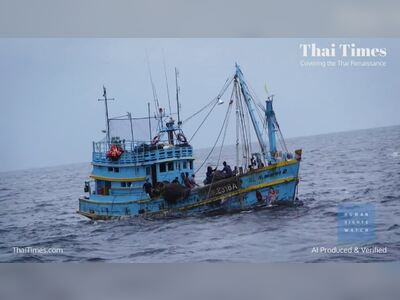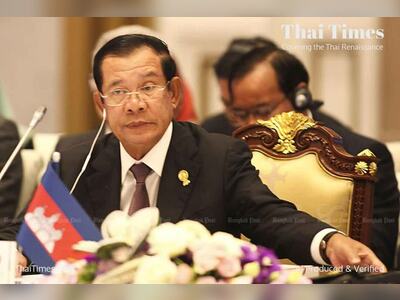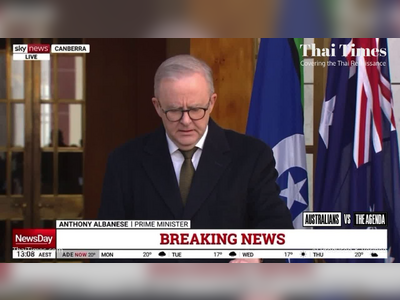Thailand Secures Historic Free-Trade Agreement with EFTA: A Milestone for Economic Growth
In a significant step toward global economic integration, Thailand has secured a historic free-trade agreement (FTA) with the European Free Trade Association (EFTA), marking the country’s first such agreement with a coalition of European nations.
The deal, which culminated after two years of negotiations, will open new avenues for trade, investment, and economic cooperation, strengthening Thailand’s role in the global market.
The agreement, finalized on Friday by Thailand’s Minister of Commerce, Pichai Naripthaphan, was celebrated as a key achievement for Thailand’s international trade policy. It includes the member countries of the EFTA—Switzerland, Norway, Iceland, and Liechtenstein—and covers a broad range of issues, including trade in goods, rules of origin, intellectual property rights, trade facilitation, sanitary regulations, and sustainable development practices. This deal is poised to offer Thailand substantial economic benefits, particularly in exports and foreign investment.
Minister Pichai emphasized that the agreement reflects Thailand’s commitment to enhancing its trade relations and expanding its economic footprint in Europe, further aligning with the country’s broader strategy to diversify its trade partners and reduce reliance on traditional markets. The agreement also positions Thailand to pursue future discussions with other major European partners, such as the European Union, which could follow the same principles outlined in this historic deal.
A Strategic Move for Economic Growth
Thailand’s successful negotiation with EFTA comes at a time when global trade dynamics are undergoing significant shifts. The agreement represents not just a victory for Thailand’s Ministry of Commerce but a strategic move to position the country as a key player in the global economy. By securing this FTA, Thailand is opening up greater export opportunities, particularly in high-value industries such as electronics, automotive manufacturing, and agriculture, where the country has competitive advantages.
This agreement also underscores Thailand’s commitment to modern trade principles. A key element of the negotiations was the incorporation of sustainable development practices. In an era when trade agreements increasingly prioritize environmental and social standards, Thailand’s inclusion of such provisions in its FTA with EFTA reflects a forward-thinking approach that is in line with global expectations. These provisions are designed to ensure that the economic benefits of the deal are achieved in a way that is environmentally sustainable and socially responsible.
The FTA also addresses the modern trade challenges surrounding intellectual property and rules of origin, both crucial elements for facilitating smoother trade relations between Thailand and its European counterparts. With a robust and evolving manufacturing sector, Thailand stands to benefit from greater access to European markets, where intellectual property protections are critical for industries such as pharmaceuticals, technology, and design.
Challenges and Opportunities Ahead
While the agreement is a major achievement, it is not without its challenges. Critics argue that while the deal benefits large corporations and export-oriented industries, there is concern about whether these benefits will be felt equally across Thailand’s entire economy, particularly in rural and less developed regions. The Thai government’s ability to ensure that the economic growth generated from this agreement is inclusive and reaches all sectors of society will be key to its long-term success.
Thailand’s government has already outlined measures to support small and medium-sized enterprises (SMEs) and regional businesses in capitalizing on the opportunities arising from this new trade agreement. By investing in infrastructure, technology, and digital platforms, Thailand is aiming to integrate even its smaller businesses into the global supply chain. However, the success of these efforts will depend on effective implementation and the government’s ability to address structural inequalities in the economy.
Another challenge lies in Thailand’s ability to maintain this momentum and continue securing similar agreements with other global powers. While the EFTA deal marks a significant step, Thailand’s future in the international trade landscape will depend on its ability to diversify its trade portfolio further, particularly with other Asian markets and emerging economies.
Looking to the Future
The agreement with EFTA marks a new chapter in Thailand’s economic journey, but it is just the beginning. The Thai government’s strategic approach to trade diversification, coupled with the country’s competitive sectors and commitment to sustainable development, positions Thailand for continued success in the global market.
By securing this deal, Thailand has demonstrated its ability to negotiate in line with global trade standards, opening the door for even more ambitious agreements with European partners and beyond. As the country moves forward, the balance between fostering economic growth, ensuring sustainability, and expanding trade opportunities will be critical to determining how far Thailand can go in its pursuit of economic prosperity.
This historic FTA not only sets Thailand on the path toward deeper integration with Europe but also signals to the global community that the country is prepared to play a leading role in shaping the future of international trade. The world will be watching closely as Thailand navigates the challenges and opportunities that lie ahead, but with this bold move, it is clear that Thailand is taking decisive steps toward a more prosperous and interconnected future.
The agreement, finalized on Friday by Thailand’s Minister of Commerce, Pichai Naripthaphan, was celebrated as a key achievement for Thailand’s international trade policy. It includes the member countries of the EFTA—Switzerland, Norway, Iceland, and Liechtenstein—and covers a broad range of issues, including trade in goods, rules of origin, intellectual property rights, trade facilitation, sanitary regulations, and sustainable development practices. This deal is poised to offer Thailand substantial economic benefits, particularly in exports and foreign investment.
Minister Pichai emphasized that the agreement reflects Thailand’s commitment to enhancing its trade relations and expanding its economic footprint in Europe, further aligning with the country’s broader strategy to diversify its trade partners and reduce reliance on traditional markets. The agreement also positions Thailand to pursue future discussions with other major European partners, such as the European Union, which could follow the same principles outlined in this historic deal.
A Strategic Move for Economic Growth
Thailand’s successful negotiation with EFTA comes at a time when global trade dynamics are undergoing significant shifts. The agreement represents not just a victory for Thailand’s Ministry of Commerce but a strategic move to position the country as a key player in the global economy. By securing this FTA, Thailand is opening up greater export opportunities, particularly in high-value industries such as electronics, automotive manufacturing, and agriculture, where the country has competitive advantages.
This agreement also underscores Thailand’s commitment to modern trade principles. A key element of the negotiations was the incorporation of sustainable development practices. In an era when trade agreements increasingly prioritize environmental and social standards, Thailand’s inclusion of such provisions in its FTA with EFTA reflects a forward-thinking approach that is in line with global expectations. These provisions are designed to ensure that the economic benefits of the deal are achieved in a way that is environmentally sustainable and socially responsible.
The FTA also addresses the modern trade challenges surrounding intellectual property and rules of origin, both crucial elements for facilitating smoother trade relations between Thailand and its European counterparts. With a robust and evolving manufacturing sector, Thailand stands to benefit from greater access to European markets, where intellectual property protections are critical for industries such as pharmaceuticals, technology, and design.
Challenges and Opportunities Ahead
While the agreement is a major achievement, it is not without its challenges. Critics argue that while the deal benefits large corporations and export-oriented industries, there is concern about whether these benefits will be felt equally across Thailand’s entire economy, particularly in rural and less developed regions. The Thai government’s ability to ensure that the economic growth generated from this agreement is inclusive and reaches all sectors of society will be key to its long-term success.
Thailand’s government has already outlined measures to support small and medium-sized enterprises (SMEs) and regional businesses in capitalizing on the opportunities arising from this new trade agreement. By investing in infrastructure, technology, and digital platforms, Thailand is aiming to integrate even its smaller businesses into the global supply chain. However, the success of these efforts will depend on effective implementation and the government’s ability to address structural inequalities in the economy.
Another challenge lies in Thailand’s ability to maintain this momentum and continue securing similar agreements with other global powers. While the EFTA deal marks a significant step, Thailand’s future in the international trade landscape will depend on its ability to diversify its trade portfolio further, particularly with other Asian markets and emerging economies.
Looking to the Future
The agreement with EFTA marks a new chapter in Thailand’s economic journey, but it is just the beginning. The Thai government’s strategic approach to trade diversification, coupled with the country’s competitive sectors and commitment to sustainable development, positions Thailand for continued success in the global market.
By securing this deal, Thailand has demonstrated its ability to negotiate in line with global trade standards, opening the door for even more ambitious agreements with European partners and beyond. As the country moves forward, the balance between fostering economic growth, ensuring sustainability, and expanding trade opportunities will be critical to determining how far Thailand can go in its pursuit of economic prosperity.
This historic FTA not only sets Thailand on the path toward deeper integration with Europe but also signals to the global community that the country is prepared to play a leading role in shaping the future of international trade. The world will be watching closely as Thailand navigates the challenges and opportunities that lie ahead, but with this bold move, it is clear that Thailand is taking decisive steps toward a more prosperous and interconnected future.











